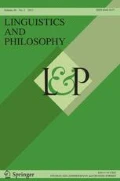Abstract
Recent Neo-Davidsonian accounts of the semantics of progressive constructions of action verbs (‘John is building a house’) reflect an ontological distinction between processes or incomplete events on the one hand, and complete events on the other. This paper has two goals. First, it attempts to show that this putative ontological distinction is beset with problems. The second goal of this paper is to offer the beginnings of a positive proposal that seeks to show how the ontologically austere Davidsonian can account for the truth conditions of progressive constructions without the need for an enriched ontology.
Similar content being viewed by others
References
Bach, E. (1981). On time, tense and aspect: An essay in English metaphysics. In P. Cole (Ed.), Radical pragmatics (pp. 62–81). New York: Academic Press.
Bach, E. (1986). The algebra of events. Linguistics and Philosophy, 9, 5–16.
Bennett, B., & Galton, A. P. (2004). A unifying semantics for time and events. Artificial Intelligence, 153, 13–48.
Bennett, M., & Partee, B. (1972). Towards the logic of tense and aspect in English. Bloomington: IULC.
Borer, H. (2005). In name only. Oxford: Oxford University Press.
Bunt, H. C. (1985). Mass terms and model-theoretic semantics. Cambridge: Cambridge University Press.
Burge, T. (1972). Truth and mass nouns. The Journal of Philosophy, 69(10), 236–282.
Caramazza, A., McCloskey, M., & Green, B. (1981). Naive beliefs in ‘sophisticated’ subjects: Misconceptions about trajectories of objects. Cognition, 9, 117–123.
Carlson, G. (1998). Thematic roles and the individuation of events. In S. Rothstein (Ed.), Events and grammar (pp. 35–51). Dordrecht: Kluwer.
Chierchia, G. (1998a). Reference to kinds across languages. Natural Language Semantics, 6, 339–405.
Chierchia, G. (1998b). Plurality of mass nouns and the notion of ‘semantic parameter’. In S. Rothstein (Ed.), Events and grammar (pp. 53–104). Dordrecht: Kluwer.
Cleland, C. (1991). On the individuation of events. Synthese, 86, 229–251.
Comrie, B. (1976). Aspect. Cambridge: Cambridge University Press.
Crowther, T. (2011). The matter of events. Review of Metaphysics, 65(1), 3–39.
Davidson, D. ([1967] 1980). The logical form of action sentences. Reprinted in D. Davidson (1980), Essays on actions and events (pp. 105–123). Oxford: Clarendon Press.
Davidson, D. ([1969] 1980). The individuation of events. Reprinted in D. Davidson (1980), Essays on actions and events (pp. 163–180). Oxford: Clarendon Press.
Dowty, D. R. (1977). Toward a semantic analysis of verb aspect and the English ‘imperfective’ progressive. Linguistics and Philosophy, 1, 45–77.
Dowty, D. R. (1979). Word meaning and Montague grammar. Dordrecht: Kluwer.
Dowty, D. R. (1989). On the semantic content of the notion ‘Thematic Role’. In B. Partee, G. Chierchia, & R. Turner (Eds.), Properties, types and meanings (pp. 69–130). Dordrecht: Kluwer.
Drake, S. (1975). Impetus theory reappraised. Journal of the History of Ideas, 36(1), 24–46.
Dummett, M. (1973). Frege: Philosophy of language. New York: Harper & Row Publishers.
Forbes, G. (2006). Attitude problems: An essay on linguistic intensionality. Oxford: Clarendon Press.
Galton, A., & Mizoguchi, R. (2009). The water falls but the waterfall does not fall: New perspectives on objects, processes and events. Applied Ontology, 4(2), 71–107.
Geach, P. T. ([1962] 1980). Reference and generality (3rd edn.). Ithaca, NY: Cornell University Press.
Gill, K. (1993). On the metaphysical distinction between processes and events. Canadian Journal of Philosophy, 23, 365–384.
Gleason, H. A., Jr. (1965). Linguistics and English grammar. New York: Holt, Rinehart & Winston Inc.
Gupta, A. (1980). The logic of common nouns. New Haven: Yale University Press.
Higginbotham, J. (1983). The logic of perceptual reports: An extensional alternative to situation semantics. The Journal of Philosophy, 80, 100–127.
Higginbotham, J. (2009). Tense, aspect, and indexicality. Oxford: Oxford University Press.
Higginbotham, J. ([1995] 2009). Tensed thoughts. Reprinted in J. Higginbotham (2009), Tense, aspect, and indexicality (pp. 53–75). Oxford: Oxford University Press.
Higginbotham, J. ([2004] 2009). The English progressive. Reprinted in J. Higginbotham (2009), Tense, aspect, and indexicality (pp. 126–156). Oxford: Oxford University Press.
Higginbotham, J. ([2006] 2009). Anaphoric tense. Reprinted in J. Higginbotham (2009), Tense, aspect, and indexicality (pp. 102–115). Oxford: Oxford University Press.
Hoepelman, J., & Rohrer, C. (1980). On the mass count distinction and the French imparfait and passe simple. In C. Rohrer (Ed.), Time, tense and aspect (pp. 629–645). Tübingen: Niemeyer.
Hornsby, J. (2002). Review work: Causing actions by Paul M. Pietroski. Mind, 111(441), 159–161.
Hornsby, J. (2012). Actions and activity. Philosophical Issues, 22, 232–245.
Huddleston, R., & Pullum, G. K. (2002). Cambridge grammar of the English language. Cambridge: Cambridge University Press.
Jespersen, O. (1923). The philosophy of grammar. London: Allen & Unwin.
Jóhannsdóttir, K. M. (2011). Aspects of the progressive in English and Icelandic. Ph.D. dissertation, University of British Columbia.
Kautz, H. A. (1991). A formal theory of plan recognition and its implementation. In J. F. Allen, H. A. Kautz, R. N. Pelavin, & J. D. Tenenberg (Eds.), Reasoning about plans (pp. 69–126). San Mateo: Morgan Kaufmann Publishers.
Kim, J. (1993). Supervenience and mind. Cambridge: Cambridge University Press.
Landman, F. (1992). The progressive. Natural Language Semantics, 1, 1–32.
Lasersohn, P. (1995). Plurality, conjunction, and events. Dordrecht: Kluwer.
Lemmon, J. (1967). Comments on D. Davidson’s ‘The logical form of action sentences’. In N. Rescher (Ed.), The logic of decision and actions (pp. 96–103). Pittsburgh: University of Pittsburgh Press.
Levinson, J. (1980). The particularisation of attributes. Australasian Journal of Philosophy, 58(2), 102–115.
Lombard, L. B. (1986). Events: A metaphysical study. London: Routledge and Kegan Paul.
Lowe, E. J. (1998). The possibility of metaphysics: Substance, identity, and time. Oxford: Oxford University Press.
Macdonald, C. (2005). Varieties of things: Foundations of contemporary metaphysics. Oxford: Blackwell.
Maienborn, C. (2007). On Davidsonian and Kimian States. In I. Comorovski & K. von Heusinger (Eds.), Existence: Semantics and syntax (pp. 107–130). Dordrecht: Kluwer.
Marcus, E. (2006). Events, sortals, and the mind-body problem. Synthese, 150, 99–129.
Marcus, E. (2009). Why there are no token states. Journal of Philosophical Research, 34, 215–241.
McCloskey, M. (1983a). Intuitive physics. Scientific American, 248(4), 122–130.
McCloskey, M. (1983b). Naïve theories of motion. In D. Gentner & A. L. Stevens (Eds.), Mental models (pp. 299–342). Hillsdale, NJ: Lawrence Erlbaum Associates, Publishers.
McCloskey, M., Caramazza, A., & Green, B. (1980). Curvilinear motion in the absence of external forces: Naive beliefs about the motion of objects. Science, 210, 1139–1141.
Moltmann, F. (2004). Properties and kinds of tropes: New linguistic facts and old philosophical insights. Mind, 123(1), 1–41.
Moltmann, F. (2012). On the distinction between abstract states, concerete states, and tropes. In A. Mari, C. Beyssade, & F. Del Prete (Eds.), Genericity (pp. 293–311). Oxford: Oxford University Press.
Mourelatos, A. (1978). Events, processes, and states. Linguistics and Philosophy, 2, 415–434.
Parsons, T. (1985). Underlying events in the logical analysis of English. In E. LePore & B. P. McLaughlin (Eds.), Actions and events: Perspectives on the philosophy of Donald Davidson (pp. 235–267). Oxford: Blackwell.
Parsons, T. (1990). Events in the semantics of English: A study in subatomic semantics. Cambridge, MA: MIT Press.
Parsons, T. ([1970] 1979). An analysis of mass terms and amount terms. Reprinted in F. J. Pelletier (Ed.) Mass terms: Some philosophical problems (pp. 137–166). Dordrecht: D. Reidel Publishing Company.
Pelletier, F. J. ([1975] 1979). Non-singular reference: Some preliminaries. Reprinted in F. J. Pelletier (Ed.) Mass terms: Some philosophical problems (pp. 1–14). Dordrecht: D. Reidel Publishing Company.
Pelletier, F. J., & Schubert, L. K. (2003). Mass expressions. In D. Gabbay & F. Guenthner (Eds.), Handbook of philosophical logic (2nd ed., Vol. 10, pp. 249–336). Dordrecht: Kluwer.
Pietroski, P. M. (2005). Events and semantic architecture. Oxford: Oxford University Press.
Portner, P. (1998). The progressive in modal semantics. Language, 74(4), 760–787.
Quine, W. V. O. (1960). Word and object. Cambridge, MA: MIT Press.
Quine, W. V. O. (1985). Events and reification. In E. LePore & B. P. MacLaughlin (Eds.), Actions and events: Perspectives on the philosophy of Donald Davidson (pp. 162–171). Oxford: Blackwell.
Ramchand, G. C. (2007). Events in syntax: Modification and predication. Language and Linguistics Compass, 1(5), 476–497.
Recanati, F. (1993). Direct reference: From language to thought. Oxford: Blackwell.
Rosenkrantz, G. S. (1993). Haecceity: An ontological essay. Dordrecht: Kluwer.
Rothstein, S. (2004). Structuring events. Oxford: Blackwell.
Savellos, E. H. (1992). Criterion of identity and the individuation of natural-kind events. Philosophy and Phenomenological Research, 52(4), 807–831.
Savellos, E. H. (2000). When are events parts? Philosophical Papers, 29(3), 223–247.
Schein, B. (1993). Plurals and events. Cambridge, MA: MIT Press.
Simons, P. (2000). Continuants and occurrents. Aristotelian Society: Supplementary, 74(1), 59–75.
Smith, C. S. (1991). The parameter of aspect. Dordrecht: Kluwer.
Steward, H. (1997). The ontology of mind: Events, states, and processes. Oxford: Oxford University Press.
Steward, H. (2013). Processes, continuants, and individuals. Mind, 122, 781–812.
Steward, H. (2018). Occurrent states. In R. Stout (Ed.), Process, action, and experience (pp. 102–119). Oxford: Oxford University Press.
Szabó, Z. G. (2004). On the progressive and the perfective. Noûs, 38(1), 29–59.
Szabó, Z. G. (2008). Things in progress. Philosophical Perspectives, 22, 499–525.
Taylor, B. ([1977] 1985). Tense and continuity. Reprinted in B. Taylor, Modes of occurrence: Verbs, adverbs and events (pp. 51–82). Oxford: Blackwell.
Thomson, J. (1997). The right and the good. Journal of Philosophy, 94, 273–298.
Unwin, N. (1996). The individuation of events. Mind, 105(418), 315–330.
Vendler, Z. ([1957] 1967). Verbs and times. Reprinted with revisions in Z. Vendler, Linguistics in philosophy (pp. 97–121). Ithaca, NY: Cornell University Press.
Vlach, F. (1981). The semantics of the progressive. In P. J. Tedeschi & A. Zaenen (Eds.), Syntax and semantics: Tense and aspect (Vol. 14, pp. 271–292). New York: Academic Press.
Wellwood, A., Hacquard, V., & Pancheva, R. (2012). Measuring and comparing individuals and events. Journal of Semantics, 29, 207–228.
Yi, B. U. (n.d.). Coercion and the mass/count distinction. Unpublished manuscript.
Zhou, Z. (2018). What the progressive aspect tells us about processes. Synthese. https://doi.org/10.1007/s11229-018-01999-5.
Zucchi, A. (1997). Incomplete events, intensionality, and imperfective aspect. Natural Language Semantics, 7, 179–215.
Acknowledgements
I wish to thank the anonymous reviewers of this journal for their helpful comments. I am also grateful to Mike Martin and Jennifer Hornsby.
Author information
Authors and Affiliations
Corresponding author
Additional information
Publisher's Note
Springer Nature remains neutral with regard to jurisdictional claims in published maps and institutional affiliations.
Rights and permissions
About this article
Cite this article
Zhou, Z. Neo-Davidsonian ontology of events. Linguist and Philos 44, 195–235 (2021). https://doi.org/10.1007/s10988-019-09292-5
Published:
Issue Date:
DOI: https://doi.org/10.1007/s10988-019-09292-5



